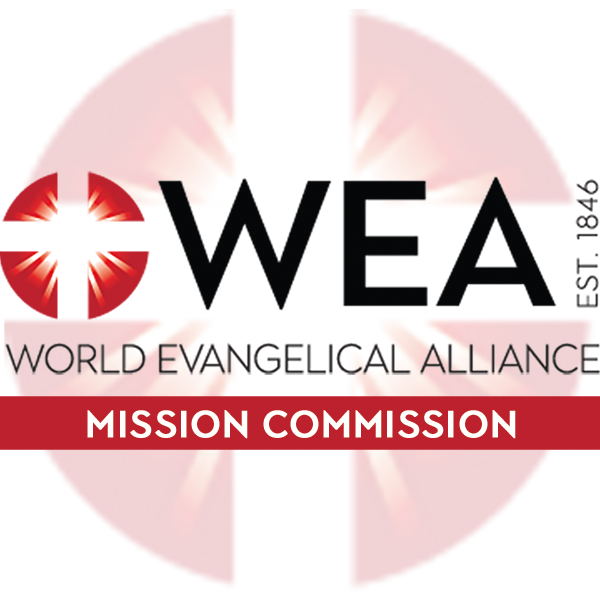2020 VIRTUAL ROUNDTABLE
Dear fellow participants in God’s mission,
Grace and peace to you in the name of the Lord Jesus Christ.
Like every event around the world, the plans for a Mission Commission Leaders Roundtable (All Nations Christian College, April 6-9) were hijacked by a microscopic organism. With everyone locked down we had no choice but to postpone and pivot to an online event. The fatigue factor in video conferencing meant that we dared not spend as much time together as we would have on site, but we could invite more people. Furthermore, we decided to change the purpose of the Roundtable from an exploration of the future of the Mission Commission under Jay Matenga, the new Executive Director, to a discussion about the future of missions in light of the devastation being caused by COVID-19
The rebooted Roundtable was designed to maximise the short amount of time we had together and help Mission Commission leaders discern direction for the Commission in the ‘new normal’ ahead of us. For that to become clear, Jay and the Global Leadership Council’s Executive Committee felt the Roundtable needed to explore what is happening now, what is unchangeable in missions, and how cross-cultural missionary service is likely to be affected by it all, since the majority of the reflective practitioners in the Mission Commission community serve in cross-cultural missions.
This report presents our findings according to a narrative logic from each session, not necessarily in order of importance nor frequency of mention in the groups.
1. What is Happening
1.1 Wellbeing Focus
The pandemic has been the catalyst for many crises, but the most personal is the emotional toll it is taking on individuals, families, groups/teams and leaders.
Whether missionaries chose to remain on the field (as many have), found themselves stuck on furlough, or returned to their passport country for health/wellbeing issues, there is no doubt COVID-19 has increased the stress levels of all and many are experiencing trauma as a result of their challenging circumstances. The pandemic has been the catalyst for many crises, but the most personal is the emotional toll it is taking on individuals, families, groups/teams and leaders. At best, we turn desperately to God in humility as we are confronted with our weakness. At worst, anxiety gets the best of us and we act it out in unhealthy and destructive ways. COVID-19 has heightened awareness of the importance of wellness and we are all confronted with the limitations of our humanity as participants in God’s mission.
1.2 Financial Impact
The coming economic crisis is going to have a devastating affect on local ministries and global missions. Economic hardships that are already evident are going to get worse. Unemployment and diminished discretionary incomes will have reverberating effects on all charitable and fundraising dependent activities. Where there might be a willingness to serve in cross-cultural missions, the resource capacity to send people and keep them in foreign service may not prove sufficient enough to enable that willingness to be fulfilled. Furthermore, drops in funding will force organisations to radically rethink operational activities.
1.3 Holistic Awareness
The anticipated increase in global poverty metrics and famine… was noted as a cause for serious missions concern.
Connected with the wellbeing issue, there is a fresh awareness of whole-of-life concerns that the gospel speaks to and through. With the shut down of industries and transport, much was being made of the positive affect on pollution levels, drawing people’s attention to what we would call creation care issues. The restrictions on travel and the acceleration of communicating and conducting business online (see 1.6), has raised the possibility of fewer in-person global gatherings in the future, which would honour a missions commitment to creation care. The anticipated increase in global poverty metrics and famine also sits under the banner of holistic awareness/integral mission and this was noted as a cause for serious missions concern.
1.4 Amplified Prayer
The desperation created by our global situation is motivating more people to cry out to God for relief. New prayer meetings and movements have begun and existing ones have been revitalised. Around Easter numerous extended calls for prayer were heard from Evangelical and other Christian bodies. Most prayer seems to be directed to one’s own concerns (or nation). It is difficult to detect any large movements of prayer for the nations and the unreached beyond a generic petition for supernatural intervention regarding COVID-19 and its effects.
1.5 Localisation
Perhaps this crisis will extend controls to indigenous missions in partnership with indigenous churches.
For the most part, the crisis has turned us inward. Borders were rapidly closed and access was made more difficult worldwide with stricter travel rules and fewer planes in the air. As the pandemic grew, so did the realisation that trans-border access would not resume to pre-COVID levels for a long time, if ever. Hope for the gospel to spread turned to indigenous/local or near-culture missions initiatives. The Great Depression of last century pre-empted the rise of the indigenously controlled local churches and denominations as traditional missions agencies faced financial hardship. Perhaps this crisis will extend controls to indigenous missions in partnership with indigenous churches (where churches exist at all). Indigenous control and innovation, however, does not exclude the need for foreign financial and relational support in appropriate ways.
1.6 Technology
The digital revolution has been accelerated by the global pandemic. Some say adoption that would have taken a decade has happened in months. The advent of reliable, clear and (moderately) secure large group video technologies like Zoom and live streaming apps opened new vistas of possibility for online fellowship, meetings, forums, conferences, and education. There has been a surge of interest in Learning Management Systems to host online courses, and missions and theological educators are developing new methods of teaching modified curricula for online learning.
One significant factor, hindering the relationship building aspect of in-person gatherings is the extra time it takes to establish trust with new contacts.
Missions conferences were postponed and are starting to shift to online participation with pre-videoed plenary speakers, Zoom-hosted break-out discussion groups, live-feed panel forums and means to meet like-minded contacts with a view to developing further relationships. One significant factor, hindering the relationship building aspect of in-person gatherings is the extra time it takes to establish trust with new contacts.
2. What is Unchangeable
2.1 God
Stating the obvious, we affirm that our God never changes or casts a shifting shadow (James 1:17). God’s mission continues. God’s shalom-kingdom continues to be made manifest by God’s people throughout the world as a witness to the world. God is working supernaturally in the world to carry out the purposes of Father through Christ by the Holy Spirit.
God will continue to send followers of Christ to carry out the mission of God.
2.2 Going
God will continue to send followers of Christ to carry out the mission of God. Hindrances and circumstances aside, the people of God called of God to move will move. The means and models will need to adapt accordingly. The activities of those who go (or remain) on missions are likely to change according to the needs of host communities. So, context will shape the way the gospel is planted (incarnated) in order for the fruit of the gospel to flourish in the soil of these new contexts as indigenously as possible. For example, this could include developing income generating opportunities for increasingly impoverished communities, providing healthcare training and nutritional advice, supplying equipment or co-developing systems for the wellbeing of communities, investing in the general education of children, etc. A whole-of-life, integrated, locally-empowered, personally-engaged, well-explained, Christ-centred witness.
2.3 Discipling
Training was mentioned frequently. We can group the training of missionaries, as well as existing and new followers of the Lord Jesus, under the title of discipling. The advent of digital tools to conduct training of all kinds from a distance has seen content and expertise continue to be created and shared. Some concern was expressed regarding the appropriateness of some training for the contexts it is shared with, particularly if longer-term access and acculturation is hindered. Collaborating toward, and resourcing, locally made and delivered Christian educational content would be preferable. Co-discipling, mentoring, coaching, facilitating, blessing, guiding, etc., were words used to define the best type of foreign involvement in the training of indigenous churches, ministers and missions workers.
2.4 Stewarding
Resources come in many forms.
Feedback over the course of the session suggested that resources come in many forms, not just financial. For example, time available for relationships, investing our influence in advocacy, sharing expertise and experience, providing material goods, teaching skills and methods, introductions to people who may be able to help, invitations to participate in wider forums, assistance with publishing, sharing creative arts, and many more things. These all carry real-world value and are expressions of common unity. Guarding and giving of what we have received from God is the basis of stewardship, it is the root of what it means to be a blessing, and it is an expression of loving mutuality. Some Roundtable participants pointed out that it is important to share what we have to offer with those in most need—particularly in unjust and impoverished settings. All in all, a generally open-handed sharing attitude was seen as an important one to nurture in missions for the hard times ahead.
3. What Roles Remain
3.1 Collaboration
Intentional collaboration across cultures provides an opportunity for the global Church to shine.
Roundtable participants expressed a general desire for a greater degree of collaboration. They noted that intentional collaboration across cultures provides an opportunity for the global Church to shine in a world becoming more fractured and darker as a result. While this might still be aspirational, for global missions in the new era ahead of us it needs to become actual. “Partnership” was thought of by some as being too transactional. “Collaboration” was preferred (at least in the English language), since it conveys more of a covenantal and enduring-relationship commitment in keeping with Biblical koinonia. This was expressed with regard to all relationships and roles in missions—between churches and agencies and missionaries and supporters and recipients and their communities. The diverse global webs of relationships that fuel God’s mission must strengthen through every means, especially when boundaries are raised higher; and blessing must be permitted to flow both ways in genuine mutuality and reciprocity.
We often speak of participating in God’s mission in terms of partnership or collaboration with God. It is tempting to use that as our model for collaboration. This can be detrimental to human collaboration, however, as it can too easily infer that some participants in the relationship (usually those with the funding) hold ‘God-like’ power over the relationship. Together, we are interdependent co-labourers as part of Christ’s body, but He remains the only head. COVID-19 is making us freshly aware of how truly weak and fully dependent we all are on Him.
3.2 Transborder Roles
In the era of missions ahead, there remain many possibilities for foreign involvement with local missions initiatives, but circumstances are likely to change what those roles will be compared with traditional models. Due to the typically higher level of missions education and longer periods of service experience, the sharing of expertise and training/equipping of (increasingly local) field workers was seen as a valuable ongoing contribution. This was offset by a caution to ensure advice and training was contextually appropriate and indigenously informed.
Providing assistance and advice to local church leaders was another suggested role, while ensuring that the local church leaders retain authority to apply or adapt any advice as they saw fit for their context (also known as self-determination). Whether with field workers or local church leaders, the relationship with external missions personnel should be seen as a peer relationship rather than a superior to inferior relationship. For that to genuinely be the case, there must be tangible evidence of reciprocity. In other words, the expatriate, foreigner or outsider, must be open to receive input and be positively changed by the relationship too.
A servant-learner posture will go a long way to helping indigenous gospel movements flourish with expatriate assistance.
For those who are able to physically relocate from sending nations to receiving nations, the roles are likely to be more those of helper/supporter than initiator/owner. Government restrictions on foreign workers may increasingly force the need to submit to local church/ministry/organisation/business authority and ownership. Such a subordinate role would be difficult for some to cope with. Nevertheless, a peer attitude towards interpersonal intercultural relationships and a servant-learner posture will go a long way to helping indigenous gospel movements flourish with expatriate assistance.
Distance relationships mediated by digital technology open a wide door of opportunity for continued engagement with missions abroad. Technologically-enabled relationships must become part of our new norms, but transborder relationships are more difficult to establish and maintain. A crucial factor in developing any new relationship is establishing trust. This is made all the more difficult with lack of physical proximity, but it is not impossible. Established missions organisations and experienced missionaries can play an important role as relationship intermediaries, connecting trusted indigenous or near-culture field workers with supportive foreign contacts, creating life-long friendships. “Co-discipling” would be a good way to frame the objective of distance peer relationships conducted via virtual communication technologies. All churchgoers everywhere could be encouraged to see the value of such relationships and shown how to participate, while receiving education about how such relationships can help them become interculturally mature followers of Christ. The sharing of learning experiences and knowledge in a transborder co-discipling relationship would have tremendous mutual benefit for all parties and positive flow-on effects for all contexts.
3.3 Church Roles
The role of the local church remains central to global missions.
Should missions organisations be able to establish co-discipling pathways and mediate strong transborder relationships, local churches would be key in encouraging these sorts of personalised missions-oriented connections. The importance of local churches being engaged in missions was frequently heard during the Roundtable. We acknowledged that relationships between local churches (modalities) and missions agencies (sodalities) remains difficult to reconcile. There is a strong desire from missions organisation leaders to collaborate more closely with local churches (both sending and receiving churches), but that is not often realised for complex reasons. We agreed that the role of the local church remains central to global missions. There remains, however, some scepticism among missions leaders regarding the possibility of missions continuing effectively if left solely to the local church. Missions organisations continue to have a prophetic role in calling churches to take seriously their God-given responsibility for sharing the gospel/making disciples beyond their immediate spheres of influence—to engage in missions. Missions organisations (foreign and indigenous) remain conduits for connecting local churches with missions opportunities, and providing training to equip church members to effectively engage in, or support, missions opportunities.
4. What Response Is Required?
In spite of the challenges that churches and missions are currently facing, and uncertainties about the future, we have cause for great optimism regarding the long-term benefits to God’s kingdom resulting from the global pandemic. In saying this, we are not in denial of the devastation caused by the virus, nor the tragedy of lives lost and relationships fractured. We are aware that now is a time for lament, for being thrust before the throne of grace to plead for mercy. It is a time to face our mortality and ask with the Psalmist, “what are mere mortals that you should think about them, human beings that you should care for them?” (Psalm 8:4 NLT). Yet, as noted in point 2.1, God’s mission continues and, theologically at least, we have to believe that this thing we are globally experiencing will be for the good of those who love God and are called according to the purposes of God (Romans 8:28). There is no other lens through which the faithful should view our circumstances. God is good. All the time. It is the Accuser who would suggest otherwise.
With the continuance of missions agreed, we asked the Roundtable participants, “How then should the Mission Commission (MC) respond and add value to the global missions community to strengthen participation in God’s mission?” Time was running short by this stage of our online forum, but responses formed a consensus around the following key elements.
4.1 Continue to Foster Connections
The MC is viewed as a significant connection hub in the complex web of global missions relationships around the world. We are not the only hub and have no desire to be so. We exist as the intersection point for missions activity within the global community served by World Evangelical Alliance. With over 640 million Evangelicals in the world, it is a large community to connect with! The global Evangelical missions community is considerably smaller though, and we endeavour to proactively connect with as many associations, networks, organisations and missions leaders and missiologists as we are able.
Roundtable participants encouraged us to continue connecting, both indirectly (through publishing reflective commentary related to missions issues and trends, and conducting deep research into missions issues) and directly (through leaders’ discussion forums and personal connections between MC leaders and missions and church leaders). As a neutral party, the MC was also seen as a conduit (but not the only one) for connecting leaders with each other, as a broker of relationships between like-minded people and entities. This was perceived as a valuable role if deeper collaboration is to emerge in the new era of missions ahead of us.
4.2 Create Conversation Spaces
The MC is seen as a “safe space” for the free sharing of missions ideas and information, without having any particular overriding agenda or ownership.
The MC is seen as a “safe space” for the free sharing of missions ideas and information, without having any particular overriding agenda or ownership. It was encouraging that the participants affirmed this, since it is a core ethos of the MC and we will continue to create spaces for conversations about missions issues that allow diverse perspectives to be shared and valued. Roundtable participates strongly called on the MC to ensure that Majority World/Global South, indigenous, younger, and local-church voices were included and heard in conversation spaces, in such a way that we are all able to learn from their perspectives. Storytelling was mentioned as a helpful way to achieve this. Sharing stories was mentioned as “food” for innovation and mutual learning and the MC should provide platforms to enable stories to be told, captured and published or broadcast.
The MC was encouraged to continue to create space for conversations to happen and participate in conversations happening amongst other networks to stay up to date about current missions concerns. Existing and emerging technologies enhance opportunities for diverse engagement, but maximising the potential of these technologies requires a different type of facilitation compared to in-person conferences. Lack of digital access for some also needs to be kept in mind.
It remains to be seen when (if ever) global conferences will be held again in a common location—at least in such a way that it does not disadvantage members of the global missions community who may not be at liberty to participate in person due to tougher border restrictions and rising travel costs.
4.3 Conduit for Reflection and Research
The MC is seen as a credible provider and promoter of sound missions information.
The MC has a long history of conducting in-depth research and compiling diverse commentary on missions issues. Engaging in missions post-pandemic will be greatly enhanced by robust and validated research in addition to well evaluated effectiveness of missions methods (both old and new). The MC is seen as a credible provider and promoter of sound missions information and should continue to relay the latest findings to the MC community and the wider global missions community.
The MC blog following has grown considerably since the series on COVID-19 implications for missions began. This will continue to be a space for publishing trustworthy reflections on missions issues. MC books will continue to be created, perhaps smaller and more frequently published editions, but still featuring diverse global voices. “The Globalization of Missions Series” will conclude, with “The Future of Missions Series” commencing. The potential for a journal was mentioned but this would require further investigation to assess the value of such a thing in light of the fine journals that already exist.
Three Themes
As a follow-up to the Virtual Roundtable, the participants were invited by email to respond with three major themes that came to their mind when they thought about their Roundtable conversations. These were collated and by far the most common themes recalled were:
- Increasing Interest in Collaboration
- Nationalisation/Indigenisation of Missions Activities
- Technology and Distance Training
These three themes map well over the data we captured from the conversations and highlight key concerns for missions in the months and years ahead. While there is a growing interest in doing missions together, it will likely be mediated via digital technologies and should be directed toward enabling (and training) missions to happen as locally as possible to the areas of greatest gospel need. In other words, we still need to mobilise the whole Church to take the whole gospel to the whole world. God’s mission is not finished. So, together, we must #stayonmission.



